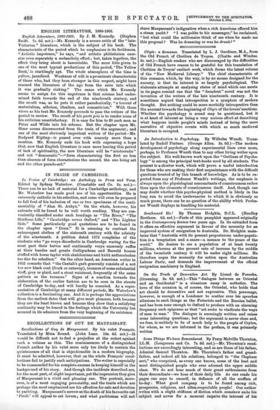ENGLISH LITERATURE, 1880-1905.
English Literature, 1880-1905. By J. M. Kennedy. (Stephen Swift. 7s. 6d. net.)—Mr. Kennedy is a severe critic of the " late- Victorian " literature, which is the subject of his book. The characteristic of the period which he emphasizes is its feebleness. "Artistic impotence," he says, "and artistic philistinism exer- cise even separately a melancholy, effect ; but, taken together, the effect they bring about is lamentable. The mere title given to one of the most typical productions of this period, 'The Yellow Book,' is startlingly apt. The whole atmosphere of the time is yellow, jaundiced. Weakness of will is a prominent characteristic of those who, had they been stronger in this respect, might have rescued the literature of the age from the mire into which it was gradually sinking." The cause which Mr. Kennedy seems to assign for this impotence is that science had under- mined faith towards the end of the nineteenth century, and the result was, as he puts it rather paradoxically, "a torrent of materialism, atheism, idealism, and romanticism." With these views as his text Mr. Kennedy proceeds to pass the writers of the period in review. The result of his parti pris is to render some of his criticism unsatisfactory. It is easy for him to fit such men as Pater and Wilde into his scheme. But the chapter upon Mr. Shaw seems disconnected from the train of the argument ; and one of the most obviously important writers of the period—Mr. Rudyard Kipling—is passed over with scarcely more than a mention. Mr. Kennedy ends his book with expressing a hope that, now that English literature is once more leaving this period of lack of spirituality, the new literature will be "aristocratic" and not " democratic "—" form characterizing the first no less than absence of form characterizes the second, the one being art and the other pseudo-art."


































































 Previous page
Previous page